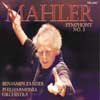Mahler Symphony No 3
Zander’s return to form in his Mahler cycle brings a powerful performance
View record and artist detailsRecord and Artist Details
Composer or Director: Gustav Mahler
Genre:
Orchestral
Label: Telarc
Magazine Review Date: 5/2004
Media Format: CD or Download
Media Runtime: 101
Mastering:
Stereo
DDD
Catalogue Number: 3CD-80599

Tracks:
| Composition | Artist Credit |
|---|---|
| Symphony No. 3 |
Gustav Mahler, Composer
Benjamin Zander, Conductor Gustav Mahler, Composer Lilli Paasikivi, Mezzo soprano London Philharmonic Choir (women) Philharmonia Orchestra Tiffin School Boys' Choir |
Author: Andrew Farach-Colton
Benjamin Zander’s cycle of the Mahler symphonies with the Philharmonia Orchestra began promisingly with a powerful and individual account of the Ninth, and continued with freshly considered versions of the Fourth and Fifth. But the Sixth, a Zander speciality, was a real disappointment – rhythmically slack and sloppily played. Happily, both conductor and orchestra are back on top form for the Third.
The conductor’s rigorously Classical approach to Mahler has become apparent from previous instalments. His application of rubato is judicious, which means that the musical line is rarely broken by any heavy pushing or pulling. The Tempo di menuetto second movement is shaped with tenderness and care, yet the basic pulse remains remarkably steady throughout. In the Adagio finale, too, Zander maintains a serenely flowing tempo, changing gears only where directed, which makes the few (though crucial) angst-ridden moments all the more potent. And he wisely avoids inflating the ecstatic final bars, drawing a mighty yet beautifully rounded fortissimo from the Philharmonia. There are places, though, where I wished he had been a bit bolder. More grit is needed in the scherzo, for instance, which, while characterful, is not nearly as cheeky as Zander suggests in his discussion of the work (included on a bonus disc), and even the normally stiff Boulez wrenches more drama from the first movement’s creaks, groans and squeals.
Still, I wouldn’t hesitate to recommend Zander’s recording over Boulez’s, as Zander provides a more comprehensive picture of this sprawling work, particularly in the central movements, where Boulez elicits surprisingly charmless playing from the Vienna Philharmonic. The Philharmonia, on the other hand, positively ooze charm. Special mention must also be made of the doom-laden, stentorian splendour of trombonist Byron Fulcher’s solos in the first movement. Alastair Mackie sustains the difficult posthorn part in the scherzo’s trio with astonishing purity of tone (on a genuine posthorn, no less), and the recording places the instrument really far in the distance, making one almost strain to hear it – a bold, evocative effect. Lilli Paasikivi is not as dusky-voiced a mezzo as one normally encounters, but I was touched by the sense of perplexed innocence she conveys in the Nietzsche-inspired fourth movement.
Horenstein’s profoundly intense account is still my benchmark, but Zander’s version deserves serious consideration. The engineering is extremely vivid (despite a few odd balances), and the discussion disc is engaging and insightful – one of the conductor’s best. Among recent releases, Abbado’s dark-hued Berlin recording is a worthy contender, though Telarc’s sound is far superior, and with the set’s three discs priced as one, it’s a bargain.
The conductor’s rigorously Classical approach to Mahler has become apparent from previous instalments. His application of rubato is judicious, which means that the musical line is rarely broken by any heavy pushing or pulling. The Tempo di menuetto second movement is shaped with tenderness and care, yet the basic pulse remains remarkably steady throughout. In the Adagio finale, too, Zander maintains a serenely flowing tempo, changing gears only where directed, which makes the few (though crucial) angst-ridden moments all the more potent. And he wisely avoids inflating the ecstatic final bars, drawing a mighty yet beautifully rounded fortissimo from the Philharmonia. There are places, though, where I wished he had been a bit bolder. More grit is needed in the scherzo, for instance, which, while characterful, is not nearly as cheeky as Zander suggests in his discussion of the work (included on a bonus disc), and even the normally stiff Boulez wrenches more drama from the first movement’s creaks, groans and squeals.
Still, I wouldn’t hesitate to recommend Zander’s recording over Boulez’s, as Zander provides a more comprehensive picture of this sprawling work, particularly in the central movements, where Boulez elicits surprisingly charmless playing from the Vienna Philharmonic. The Philharmonia, on the other hand, positively ooze charm. Special mention must also be made of the doom-laden, stentorian splendour of trombonist Byron Fulcher’s solos in the first movement. Alastair Mackie sustains the difficult posthorn part in the scherzo’s trio with astonishing purity of tone (on a genuine posthorn, no less), and the recording places the instrument really far in the distance, making one almost strain to hear it – a bold, evocative effect. Lilli Paasikivi is not as dusky-voiced a mezzo as one normally encounters, but I was touched by the sense of perplexed innocence she conveys in the Nietzsche-inspired fourth movement.
Horenstein’s profoundly intense account is still my benchmark, but Zander’s version deserves serious consideration. The engineering is extremely vivid (despite a few odd balances), and the discussion disc is engaging and insightful – one of the conductor’s best. Among recent releases, Abbado’s dark-hued Berlin recording is a worthy contender, though Telarc’s sound is far superior, and with the set’s three discs priced as one, it’s a bargain.
Discover the world's largest classical music catalogue with Presto Music.

Gramophone Digital Club
- Digital Edition
- Digital Archive
- Reviews Database
- Full website access
From £8.75 / month
Subscribe
Gramophone Full Club
- Print Edition
- Digital Edition
- Digital Archive
- Reviews Database
- Full website access
From £11.00 / month
Subscribe
If you are a library, university or other organisation that would be interested in an institutional subscription to Gramophone please click here for further information.




